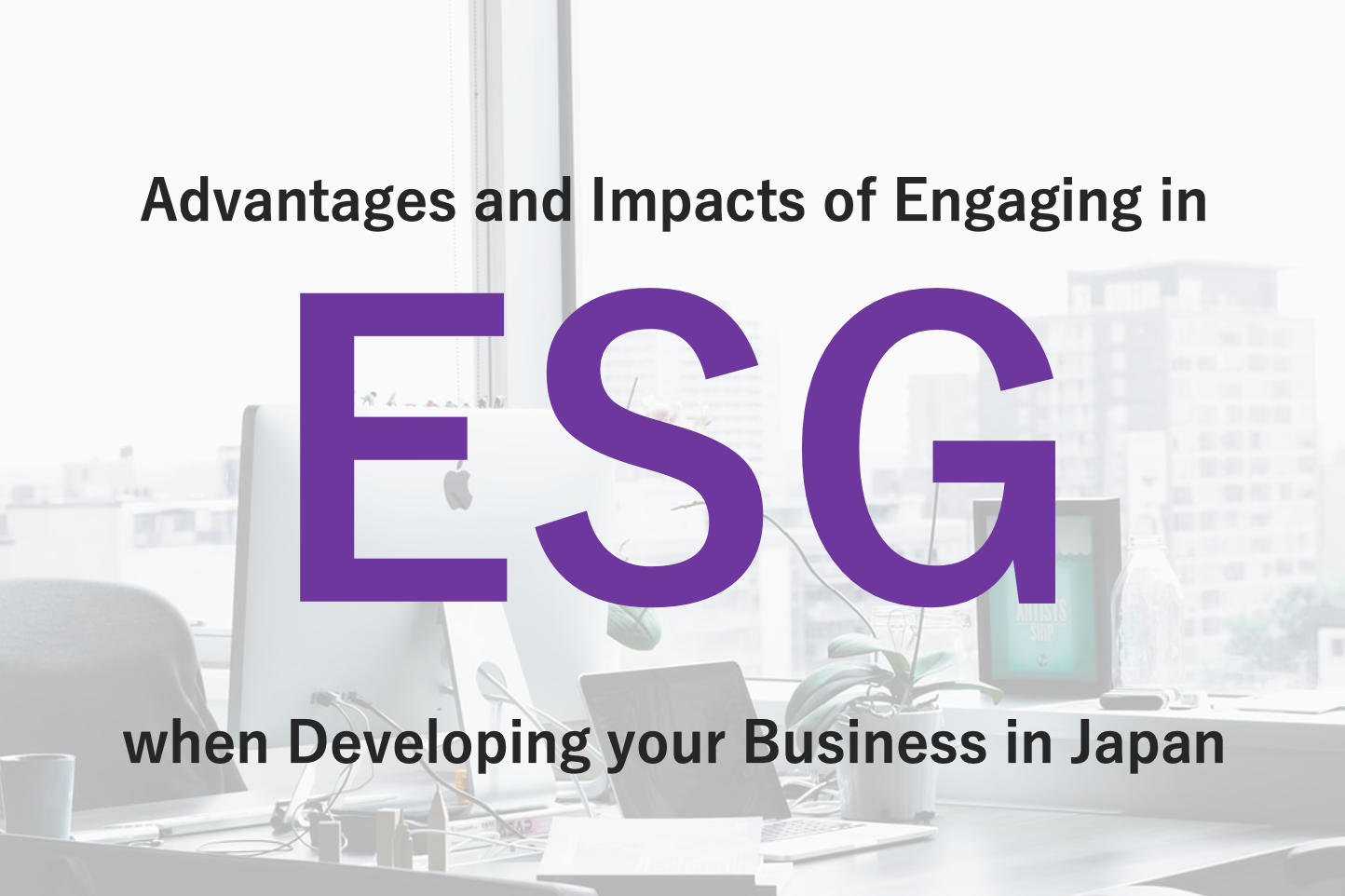Generally, profitability is the main concern when setting up a business, as it is crucial for the existence and success of a business as well as the business growth. However, it is also necessary to extend your thought to the society and environment when starting your business.
A business is a part of the society and environment, so they equally impact the growth and success of your business. Recently, the focus on achieving Sustainable Development Goals (SDGs) through all sectors of life is increasing. Concepts such as ESG and CSR are employed in the business sector towards attaining sustainable business operations and creating a sustainable society.
In this article, we have discussed these concepts, with a focus on ESG, and we have summed up the impacts of ESG and its advantages on your business development in Japan.
【Contents】
- What is ESG?
- Corporate Social Responsibility (CSR)
- Sustainable Development Goals (SDGs)
- What is an ESG investment?
- Advantages of engaging in ESG in your business
- Impacts of engaging in ESG in your business
- Conclusion
What is ESG?

ESG stands for “Environment, Social, and Governance.” ESG is one of the ways used in the evaluation of the corporate value of a business. Thus, it is an important factor to consider for the long-term growth of your business.
Each of the elements of ESG has some areas of focus that serve as the driving force for business growth.
Environment;
- Global warming countermeasures
- Biodiversity protection and conservation activities
Society;
- Attitude toward human rights
- Community contribution activities
Governance;
- Compliance with laws and regulations
- Independence of the non-executive directors
- Information disclosure
Corporate Social Responsibility (CSR)

Corporate Social Responsibility refers to how companies take responsibility toward society, by engaging in social and environmental contribution in their business operations. CSR involves all the practices put in place by companies in order to achieve sustainable development.
An international standard on social responsibility, ISO 26000 has been developed to serve as a guide to help organizations address social responsibilities and environmental impact. The ISO 26000 has 7 main principles;
- Accountability
- Transparency
- Ethical behavior
- Respect for stakeholders’ interests
- Respect for the rule of law
- Respect for the International Code of Conduct
- Respect for human rights
The application of ISO 26000 is increasingly used as a way of evaluating a business’s commitment to sustainability and the performance of the business.
CSR is similar to ESG with respect to the attitude toward society, and both are important for business development. However, they differ because CSR is important mainly in gaining the trust of the customers, investors, employees, and society, while ESG is for gaining a good evaluation from investors and it is related to ESG investment. Additionally, CSR is a company ‘responsibility’, thus it is an obligation while ESG is a factor to be considered for the company’s development.
Sustainable Development Goals (SDGs)

Another keyword that comes to mind when discussing sustainability is the Sustainable Development Goals. The SDGs are also known as the Global Goals and were adopted by the United Nations Member States to end poverty, protect the planet, and ensure that all people enjoy peace and prosperity by the year 2030.
Although both ESG and SDGs are important concepts for realizing a sustainable society, there is a difference between the two. ESG is a way of thinking adopted by companies to achieve SDGs, while SDGs are the goals that are to be achieved. Therefore ESG is an important key for a company to achieving SDGs.
If you want to learn more about SDGs and related businesses in Japan, you can check out our article on SDGs Startups.
What is an ESG investment?

ESG investment is literally the investment based on ESG. Most investors pay attention to whether a company has good direction and policy in terms of Environment, Society, and Governance. There are some reasons why ESG investment has gained the attention of investors. Firstly various external factors such as the natural environment and local communities have come to influence the growth of companies. In addition, as a result of expanding businesses, negative impacts on society such as environmental pollution and labor problems have become significant. Negative aspects of capitalism, such as economic disparity and the destruction of nature, have become a problem as well. These have caused more and more investors to assess whether a company considers ESG in their business operations. Consequently, ESG has become an important factor in gaining investments for your business.
Advantages of engaging in ESG in your business

- Developing your business
By engaging in ESG, and making the public know you are engaged in ESG, it is easier to get attention from new customers and business partners, as engaging in ESG enhances the corporate value of your company. The Global Sustainable Investment Review 2018 shows that the market size of ESG investment in Japan increased to 231 trillion yen, an increase of 306 % between 2016 and 2018. This is the highest in the world in terms of growth rate within two years. The ESG investment market in Japan is expanding at an accelerating pace, and we can expect this trend to continue for some time to come. Therefore attention to ESG initiatives can be expected in the future, which means you can develop your business with ESG.
- Upgrading the risk management
All three elements of ESG; environment, society, and corporate governance, can be a risk to a company if not well accounted for. For example, there are many companies whose productivity drops significantly due to the deterioration of the natural and working environment. In addition, the element “Governance”, greatly involves gaining the trust of the customers and stakeholders. By properly considering ESG, and reducing the risk related to each of the elements, not only will your business be safe, but it will naturally draw the attention of consumers and investors.
- Improving the corporate branding
Since “Environment, Society and Governance” are important elements for achieving a sustainable society, companies that work on ESG are recognized as companies that fulfill their responsibilities to society. This will also be effective in improving your corporate image and branding. Having a high corporate image and brand image through such efforts will lead to attracting excellent human resources to the company. As a result, companies that are actively working on ESG also benefit when hiring employees.
Impacts of engaging in ESG in your business

In addition to the advantages ESG offers for developing your business, business engaging in ESG has some impacts on the members of Japanese society.
Customers
An increasing number of customers tend to focus more on spiritual values like sustainability when choosing products. For that reason, the following consumer movements are currently active.
- “Green consumption”
… Consumer movement to protect the environment by selecting products that are as environmentally friendly as possible
- “Green consumption”
… Consumption behavior that considers people, society, and the environment
Employees
One of the social issues in Japan is the work environment. In 2019, 18.3% of Japanese workers worked over 49 hours per week, with one in four men over working. This is the highest among developed countries such as the United States, the United Kingdom, France, and Germany.
Thanks to ESG management, there is a review of the working environment while evaluating the element of governance. This can give employees an opportunity to work in a sustainable environment.
Also, as a member of the company that engages in ESG, employees will become aware of environmentally and socially responsible behavior.
Stakeholders
You can appeal to business partners that your company attaches great importance to ESG, which also makes it easier for companies to form partnerships and strengthen their relationships with your business partners. This is because almost all companies tend to care about whether or not the business partners’ activities have an ESG perspective in order to improve their corporate branding.
Local community
Currently, “regional revitalization (地方創生 Chiho Sosei)” like job creation and population retention is being emphasized all over the Japanese municipalities especially in the rural regions. Population decline is one of the major issues in the rural regions of Japan. According to the Ministry of Land, Infrastructure, Transport and Tourism, the current population will decrease by more than 50% in about half of the country by 2050. Even if the municipalities alone try to eliminate the bottleneck, funds, human resources, and knowledge are lacking. Many local communities believe that the companies with ESG have impacts on these local issues, and will help with the regional revitalization.
Investors
As explained above, ESG investment has gradually gained the attention of investors. Moreover, thanks to the aspect of “Governance” in ESG, the companies are required to disclose certain information. This gives investors more company information used in making a decision on investment.
Conclusion

In conclusion, ESG is an indispensable viewpoint for developing a business in Japan and has a large impact on some communities. Thus, we recommend valuing ESG in your business when you start and develop your company in Japan.
Notes for the readers:
Please use this article only as a reference, not as a legal guideline. Sugee.jp will take no responsibility or liability, so far as legally possible, for any consequences of your actions. This article was written by Kyoko, a SUGEE writer, on 20 June 2021.
References
[1] ESGの意味とは?CSRやSDGsとの違いや企業での対応法について徹底解説 Retrieved 20 June 2021 from https://the-owner.jp/archives/3502
[2] ESGとは?ESG投資の定義や具体例、企業事例をわかりやすく解説! Retrieved 20 June 2021 from https://www.kaonavi.jp/dictionary/esg/#ESG-10
[3] ESG投資・ESG経営とは?本当の企業価値を高めるために理解しておきたいポイント Retrieved 20 June 2021 from https://the-owner.jp/archives/863
[4] ISO 26000 ー Social responsibility Retrieved 20 June 2021 from https://www.iso.org/iso-26000-social-responsibility.html
[5] Global Sustainable Investment Review 2018 ー Global Sustainable Investment Alliance Retrieved 20 June 2021 from http://www.gsi-alliance.org/wp-content/uploads/2019/06/GSIR_Review2018F.pdf
[6] 令和2年版過労死等防止対策白書 | 厚生労働省 Retrieved 20 June 2021 from https://www.mhlw.go.jp/wp/hakusyo/karoushi/20/index.html



